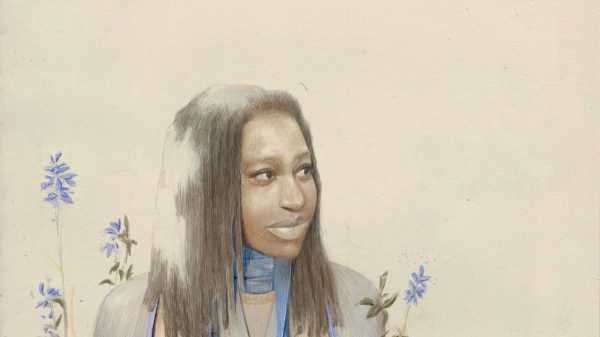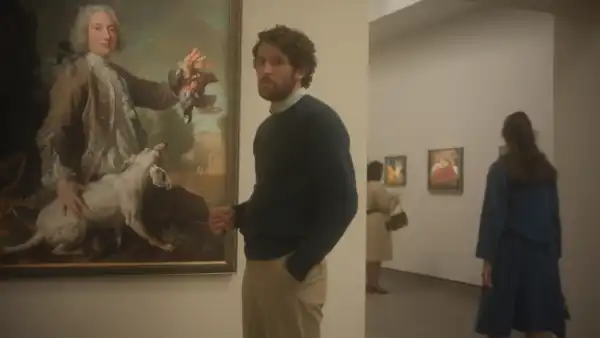
Save this storySave this storySave this storySave this story
Every villain gets an origin story, but in the case of Thea, the wedding guest from hell in Helen Oyeyemi’s newest novel, “Parasol Against the Axe,” her own mother wrote it. The book flashes back to Prague, in the nineteen-eighties, when Dagmar Dlouhá, Thea’s mother, penned a series of popular children’s books starring her daughter—or rather, a fully actualized Eastern Bloc version of Thea, capable of climbing mountains and cycling the Alps while her counterparts in the West sold Girl Scout cookies that they didn’t even bake. No, storybook Thea would boil the Czech knedlíky herself. In one book, she and a boy named Li Jie get into a friendly debate over the merits of the Czech dumplings versus those of Chinese jiaozi. As per the genre conventions of socialist realism, Thea and Li seize the means of dough production, each taking command of a dumpling factory to pump out their own national variant for a taste-testing contest. Eventually, they reach a détente, arriving at the happy—and politically correct—realization that with such a bounty of boiled meat for all to stuff themselves with, there is no need, or room left, for competition. After the real Thea emigrated to the U.S., other kids taunted her with a catchphrase from the story, “Don’t thank me—thank Progress! It’s UNSTOPPABLE.” As an adult, Thea processes her childhood trauma by barring her friends from moving forward, down the aisle or elsewhere, as if progress were her Cold War nemesis or romantic rival.
You might say Oyeyemi is a collector of stories that follow children, especially girls, into adulthood. Born in Nigeria in 1984 and raised in London, she is best known for spinning classical fairy tales into new forms, not to clumsily revise their politics in the way of the who-asked-for-this Disney reboots, but to use make-believe to defamiliarize all that we have been made to believe. Her fourth novel, “Mr. Fox,” from 2011, based on the British folktale of the same name, was a Bluebeard story about a novelist who keeps gruesomely killing his heroines until one of them comes to life to stop the massacre. Three years later, Oyeyemi followed “Mr. Fox” with “Boy, Snow, Bird,” a loose retelling of “Snow White,” where magical mirrors play tricks on a family of fair-skinned African Americans passing as white in nineteen-fifties Massachusetts. In 2019, she released “Gingerbread,” in which she updated “Hansel and Gretel” for the Brexit era. Oyeyemi’s version of the tale revolves around an “alleged nation state” called Druhástrana (Czech for “the other side”) where children inside a gingerbread house are not to be eaten but exploited, starved of the fruits of their labor. Meanwhile, nostalgic royal-watchers long for a fictional past and polish one of the country’s key landmarks—a single large shoe—in hopes that “a giant Cinderella” will return to claim it.
Oyeyemi’s next novel, “Peaces” published in 2021, felt like a departure, and not just because it was set on a train. That book was less fairy tale, more millennial breakup fable, where the ones we’ve ghosted quite literally haunt us and our happily ever afters. The past also comes back to terrorize the smugly coupled in “Parasol Against the Axe,” the first of Oyeyemi’s novels set in the Central European city she has called home since 2013. Oyeyemi told me she was hesitant to set a novel in Prague, citing the “excellent body of work” already devoted to the place. As a cultural capital, Prague existed in the shadows of modernist Paris and Barcelona, but a touch of darkness has been its ace. Under Communism, Czech literature became increasingly known for its black humor, for satirist-dissidents such as Ivan Klima and Václav Havel, and for tipsy readings of samizdat literature at the pub. Though she may not belong by birth, Oyeyemi—whose sense of humor is more wicked than her reputation as a reteller of fairy stories would suggest—fits in, like a scullery maid who becomes the belle of the ball.
“Parasol Against the Axe” begins with Hero Tojosoa, a self-described “ex-journalist” from Dublin, arriving in the storied city. She’s ostensibly there to attend her old friend Sofie’s bachelorette party. In reality, she’s running from the mail. The subject of an exposé she published killed himself, but not before arranging for a letter to be sent to Hero after his death. For the journey, Hero has packed a copy of “Paradoxical Undressing,” a novel written in the early nineteen-nineties, following the Velvet Revolution. That book, another of Oyeyemi’s meta-textual inventions, reflects the contradictions of a country teetering between Communism and a market economy. You might be able to mass-produce the book’s outer binding, but the pages inside it resist commodification. That’s because no two readings of “Paradoxical Undressing” are alike. Everyone’s version of it is uniquely their own. The same could be said of Prague, and, indeed, of marriage. This is, after all, a novel about getting hitched. Just one hitch: Thea. Sofie and Hero’s old roommate is not about to let a couple of “I do”s close the book on their (mostly platonic) threesome. Franz Kafka said of his home town, “Prague doesn’t let go. This little mother has claws.” As with old cities, so too with old flames.
I talked to Oyeyemi over Zoom about her new novel, the novel within it, and how she knew Prague was the one after a string of dates with other cities. Our conversation has been edited for length and clarity.
Your background is blurred so I can’t do that New Yorker interview move of making pithy observations about your surroundings.
Tell everyone I’m coming to you from the void.
It’s funny, because I’m going to ask you a lot of questions about place and the slipperiness of it in your work. I’m assuming that you’re coming to me from Prague, but I don’t actually know for sure.
I’m in a small flat on the riverside in Prague.
Your new novel is set in Prague, where—if the Internet is to be trusted—you’ve been living since 2014.
2013, actually. 2013 was the second time that I moved here. I lived in Prague in 2009, and I liked it so much I felt delusional. So I dated other cities, on my friends’ advice. Then I came back for good in 2013.
So is there something about Central Europe that you’re drawn to?
No, not necessarily. If I could live anywhere, it’d be Seoul. Every time I visit Seoul, it’s different. I remember the first time that I went there; it was because my book had been translated into Korean. There’s a replica of the Prague Astronomical Clock there. It felt like a blessing from Prague, like the places that I love were connected in some way, by some rubric that I am not aware of yet.
I’m hoping we can talk a bit about Prague as part of the former Eastern Bloc, which you raise in the novel. My background is in Slavic languages and literature. I loved the reference to Pushkin and “Peter the Great’s African” in “Boy, Snow, Bird,” by the way.
How did you fall into Slavic languages?
Oh, completely by accident. I wanted to study literature, but I was interested in politics, too. I was eighteen and I wanted to make a difference in the world. Then I saw this class called “Literature and Revolution,” and I hoped it might resolve some of these questions for me. I didn’t realize it was Russian literature. Most of the students, it turned out, were heritage speakers. When I first arrived in the class, I was, like, “Who are all these radical blondes?” Russians.
[Laughs.] Radical blondes. I love it. Did it satisfy your craving for revolution?
I don’t know. It showed me the flip side of what happens when people take literature’s capabilities too seriously. Russia’s a place where they killed their poets.
So your new novel is set in Prague, and all the characters are reading a novel called “Paradoxical Undressing,” which is set in Prague as well. And yet, there seems to be some tension in the story about what a “Prague book” is; even that term is used flippantly within the novel to describe “Paradoxical Undressing.” What would you say is your relationship to place and place writing? Are you uneasy about attaching stories to fixed localities?
I am uneasy about it. Once you start trying to nail down a place is when it begins to elude you. That’s especially the case with Prague. It’s hard to know what you’re talking about when you talk about Prague. Which Prague? Which aspect of it do you mean? When people talk about London, too, I don’t know which London they’re talking about. I know my very specific South London context, like the streets of Deptford. When I went to school in Holland Park, I would get on the Tube for forty-five minutes, and it felt like I had travelled across the world. It’s tricky to talk about a place. There is always some element of deception involved with trying to represent a place, and I wanted to be upfront about that in the text.
There’s a funny scene early in “Parasol Against the Axe” when Sofie’s fiancée, Polly, picks Hero up from the airport, dramatically intent on showing her “the real Prague.” She proposes taking Hero to a gas station on the outskirts of the city to drink Brazilian coffee. So you’re not necessarily buying into this idea of the real Prague over the not-real Prague. I think you’re saying, All these Pragues are real.
Yeah, I think that’s a completely false dichotomy. Real and pretend are the same thing at different times. This is part of what I love about fiction and the reading of fiction. It’s allowed me to discern different types of imaginary. Even when it comes to media and political processes, it’s not a question of what is imaginary and what is not: it’s just a case of whose imagination is at work here. What is being acted on and who is being acted on? Who’s being shaped in this kind of delusory crucible? It’s a constant process that only fiction observes and embraces. That’s why I exaggerate so much in my fiction. Whatever can happen does happen. I’m delighted by letting the story run away with itself in that way.
As you were talking, I was thinking of a friend of mine from India who bristles when Westerners complain about other Westerners going to India for luxury yoga retreats because that’s not “the real India.” He’s, like, “No, that’s also India. That’s part of it, too.”
We’re talking about literature that isn’t tied down to one particular place, that’s of many places. I’m curious how much you were thinking about the circulation of literature during the Cold War, because the tradition of tamizdat—literature smuggled abroad to be published—comes up at one point in the novel.
There was an artistic movement toward what people would call inner emigration. The lines along which a lot of art of that period went was, like, “I cannot go anywhere physically, so my mind has to go. [Laughs.] My mind has to invent new countries that exist in the name of existing countries.” Just inventing and reinventing what already exists and inventing and reinventing selves that are not physically free. It’s something that moves me. It’s something that I follow, as in spread.
“Paradoxical Undressing” is different for each person who picks it up, and it also changes each time a person picks it up. We’re treated to the main frame story and then to all these ones within, different stories set in Prague over the span of some four hundred years, from Cold War spy thrillers to a medieval B.D.S.M. love triangle.
I love hearing it described that way. First time.
Oh, I love that story. Is each character getting the book they want or the book they need? Or is that completely irrelevant? Do the stories that come to us not care if we need or want them?
No, the book is responding to who the characters are. I don’t think that Hero could ever read a version that would be in any way analogous to the version that Thea reads. It’s very much tailored to the individual, and maybe that’s what Prague does, too. It finds a way to speak to you in your particular language, meeting you exactly where you are at that time, to tell you that it’s not going to give you what you want. That’s how it is—it goes all the way through space and time to come up to you and just say no, which is what everybody who’s tried to take control of Prague has eventually figured out. It’s not malevolent. It’s more, like, “I can’t be who you’re telling me to be, so what are we going to do here?” That’s the thing with Prague and that’s the thing with “Paradoxical Undressing.” It’s meant to say, “I don’t know what you are expecting from a novel, but this is the novel that is here for you right now.”
I’m thinking about the moment when Sofie’s mother is relaying the plot of “Paradoxical Undressing.” In her version, the main character is a disinformation agent. But since that doesn’t happen in anyone else’s “Paradoxical Undressing,” she gets called out—essentially for being a disinformation agent.
But a novel-within-a-novel feels of a piece with the voracious appetite for story I see across your writing. You seem to be looking for ways to fit in as many stories as possible into a single one. In “Mr. Fox,” for example, the character Mary Fox is a muse whom the novelist Mr. Fox has invented in his mind, and yet, she has a rich life of her own. She even has dreams. In one of the dreams, she writes romance novels under the pen name Wendy Darling. I started doing the math, adding up the guises, and I realized that you have a fictional fictional character, dreaming of a fictional version of herself who writes novels using a name taken from a different fictional character. What interests you about this layering of artifice, these stories upon stories upon stories?
I don’t know if this is going to change, because I can actually feel my writing changing; it’s almost like being a teen-ager and feeling your bones getting longer. But all of my stories so far are about stories, because I want to know what they are. Sometimes I lean toward the idea that language is a virus—if you put down a few words, they turn into something else and turn into something else and turn into something else. If you leave that unchecked, you have maximum story. Are stories self-generated? What actually are stories? In a way, I try to provoke stories and get them to show us what they are and what they mean. Do they mean to harm us? Are they vehicles for revolution? Can they heal us of all the things that make us sad and sick? Do they actually just want to make us crazy? Do they want to deceive and delete us?
Sometimes when I read other writers, particularly Rachel Cusk, I’m struck by how their books have internal engines. Cusk shows how stories gather weight and mass and cannot be rolled back. Her stories are almost a clinical observation of that process. I feel such envy because I can’t observe that way in my own work. I’m just in it. [Laughs.] I let it get out of hand. I’m complicit.
I notice a lot of your characters are journalists. Hero is a journalist. And, in “Boy, Snow, Bird,” Mia, the reporter, compares journalism to working in a pawn shop: “It’s more like my mind’s stacked with all these incongruous items, other people’s stories that I’ve been telling pieces of. And the people don’t come back for their stories, but that doesn’t make them mine.” So even when your characters don’t write fiction, they still tend to be looking for stories to get out of people.
Well, it’s slightly malicious because journalistic authority has a higher status than that of fiction. I like to drag journalists into the story and make them see what fiction can do. I’m trying to level the playing field.
What can fiction do that journalism can’t?
I think it can reconcile diametrical opposites in a way that nonfiction can’t, because what has happened is just what happened. Fiction is on an axis where you are looking at what has happened, what may happen, what cannot happen yet does happen. You have more of a spinning globe. Now I’m becoming quite mystical.
Do you ever get lost in your own novels? With Mr. Fox, there were a few times where I thought, “Wait, are we still in the frame story?” When Hero gets lost in Prague, it felt like a commentary on what you like to do in your stories, as well: disorient us.
I’m glad you picked up on that. Yes, I do get lost, and that’s when I feel happy. I’m like, “Oh, good, the fictioning has really begun.” If I have one goal as a writer, it’s to make sentences that move at the speed of thought. We free-associate all the time between everything. We’re in one place, then we’re in another, and then we’re here. I just want to course through every conceivable construct. So when, at a certain point, you do stop and think, Where am I?, that for me is it!
The connection to travel is interesting because people often talk about how much they enjoy getting lost in a city. It’s the only thing we really say that about, but you’re right—we also can enjoy getting lost in a book.
I hope so.
I enjoy getting lost in your books.
Thank you, Jennifer.
At one point, Hero loses her copy of “Paradoxical Undressing.” So she goes to the Clementinum, a library in Prague. It’s a place that she says she has visited sixteen times previously, but she means through fiction, through Borges’s story “The Secret Miracle,” in which a character goes blind looking through all the pages of all the books in the Clementinum in search of a secret letter from God. While Hero is there, the librarian picks up a copy of “Paradoxical Undressing” and reads it out loud. His version of the novel sounds like a missing chapter from Italo Calvino’s “Invisible Cities.” Kublai Khan arrives in a city, Prague, “where no such city ought to have been.” He asks the people there, “Is this still the East?” In this scene, two influences, Borges and Calvino, converge. Could you say more about how they’ve shaped your work?
Calvino is probably the most seductive writer for me. I begin each of his books thinking, No, I don’t think so—I don’t think I’m going to get involved with this. Then I’m slowly, slowly drawn in. Maybe I summoned his powers with this particular book because Prague did that to me. The first time I came, I didn’t like it. Then a year later, I just packed up all my stuff and moved there.
Borges is more like a friend. There’s something about him that accompanies you through every conceivable space and through every turn of the mind. That was another power that I wanted to call upon in my love letter to Prague. “Prague, I want to accompany you through every turn, through the four hundred years that you’ve already been through and all the years to come.” That kind of soppy, romantic stuff . . .
I can’t help but think about the letter that Hero is running away from. What does it mean to run away from a letter? What were you thinking when you constructed that frame as the reason she flees to Prague?
As a reader, if I sense that something is directed toward me or that I’m supposed to relate to it in a particular way, I automatically draw back. I feel instantly manipulated. If there’s a message, I’m, like, “Oh, no, no.” Hero is like that. I hope that people drawn to the novel and to Prague are like that. I need to be spoken to in symbols, or I need to be spoken to indirectly. Otherwise, I don’t like it. I took an indirect approach to writing about Prague because if someone said to me, “This love letter is to you. Read it,” it’s not going to get read.
No one wants that kind of love letter. Everyone wants some mystery. People like to decode text messages.
While writing, I was also thinking about Oscar Wilde’s “De Profundis.” Can you imagine a letter like “De Profundis” being addressed to you? The guy that Oscar Wilde sent it to denied having received it. I felt like he denied receiving it because he had received it, read it, had been wrecked and ruined by this letter. [Laughs.] That was on my mind, the possibility that a letter could do that to you. If such a letter is addressed to you, you must not read it to save your own life.
One of my favorite lines in your work is in “Boy, Snow, Bird.” The character Bird fantasizes about selling food on the roadside to travellers. She thinks, “That’s the ideal meeting . . . once upon a time, only once, unexpectedly, then never again.” It occurred to me that’s what happens when people read “Paradoxical Undressing.” It’s the first time every time. Do you mean to say something about our first encounters with books?
No, I think that only applies to people. It’s a great tragedy that we keep in touch so much. There are so many connections that shouldn’t last as long as they do. But, no, with books, I’m very much a rereader. I reread all the time. Books wait for you, and they blossom in the time between readings.
So we should reread more and stay in touch less?
Yeah. All the time that we spend maintaining these garbage connections should be used to reread.
That’s interesting, because the novel is precisely about a garbage connection that makes its way back even when it shouldn’t. Not everyone needs to be invited to your wedding.
Exactly. ♦
Sourse: newyorker.com







